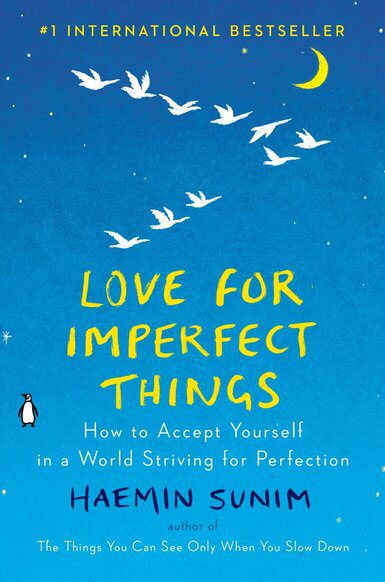“True freedom is being without anxiety about imperfection.” —Sixth-century Zen master Sengchan
Zen Buddhist monk Haemin Sunim argues that by only accepting yourself–and the flaws that make you who you are–can you have compassionate and fulfilling relationships with your partner, your family, and your friends. Love for Imperfect Things shows how the path to happiness and peace of mind includes not only strong relationships with others but also letting go of worries about ourselves.
Favorite Takeaways: Love for Imperfect Things
Chapter One: Self-Care
“Be good to yourself first, then to others.”
Just as on a plane, you are told to put the emergency breathing mask on a child only after you have put one on yourself, there is nothing selfish about looking after yourself first. Only if you are happy will you be able to make those around you happy.
Seeing on social media how your friends are enjoying themselves, have you ever felt envious? One of our common mistakes is to compare how we feel inside with how our friends appear outside.
“We don’t know what is going on inside of our friends but we are well aware of what is going on inside of ourselves. Your friends might be envying you based on your social media posts, without knowing what is really going on in your life.”
“If you hear a voice within you say ‘You cannot paint,’ then by all means paint, and that voice will be silenced.”—VINCENT VAN GOGH
When I extend a small kindness to others, I find it easier to like myself. If you feel that your self-esteem is low, try doing something nice for a stranger. As you begin to like yourself, your self-esteem will improve.
Even products labeled “limited edition” are made on a production line with hundreds that are exactly the same. But there is only one you in the world. Please cherish the unique individual that is you.
Chapter Two: Family
Losing someone precious to us is like losing the compass that pointed to life’s meaning; it seems as though we will never find true north again. The experience of life’s impermanence is a great lesson. For those of you who are suffering, may this experience become an opportunity to wake up to the Truth beyond impermanence.
“Some people come into our lives and quickly go. Some stay for a while and leave footprints on our hearts, and we are never, ever the same.” —FLAVIA WEEDN
There are many aspects of life that we cannot control. When it comes to our children, spouse, relatives, and friends, we can love them, pray for them, show them interest, but we cannot control them, even when we have good intentions, since their happiness ultimately depends on themselves. Let them take responsibility for their choices. When we get through an illness, we develop immunity. If we protect others from illness, they may not develop proper immunity against life.
If you were often rejected or ignored by your parents, while growing up, you can end up seeking the love and attention you were denied from your romantic partner instead. If your partner is even slightly indifferent toward you, then the wound from your childhood can be ripped open, causing a big fight with your partner. But the real cause isn’t your partner; it’s the wound you are carrying within you.
Rather than projecting this wound onto your partner and causing a fight, set aside your pride and speak from the heart: “I am terrified that you will reject me and leave me, like my mom did.” If we combine painful memories, the need for attention, and pride, the relationship can easily be ruined.
Chapter 3: Empathy
There are those who love you for who you are, and there are those who love you for what you do. There is no change in the love of those who love you for who you are, even when you make a mistake or fail. Such people are your true friends and family.
Rather than trying to improve someone, just be a mirror, reflecting on them without judgment. If you want them to improve, you stop seeing them as they are. Instead, you see only their shortcomings, measured against your own subjective standards.
When dealing with someone unyielding and difficult, say to yourself: “Just like me, he needs to support his family. Just like me, he’s thinking about his future. Just like me, he must be facing a hardship that not many people know about.”
Chapter 4: Relationships
DEALING WITH DISAPPOINTMENT
Our feelings of disappointment stem from having expectations of another person that go unfulfilled. Such expectations are often unspoken, and yet we wish that people would somehow figure them out based on nonverbal clues and fulfill them for us.
Much of the stress in relationships comes from the lack of communication. If you stop talking to each other, your hearts will grow distant and you will misunderstand each other. In your relationships with family, partners, and friends, however angry you may be, do not let the rope of conversation go slack for very long.
If you want to excel in a relationship, the way to do so is very simple: Give more than you receive. The more we receive, we can’t help but feel grateful and like the person.
If you want a more harmonious relationship, stop monitoring who owes what. If you constantly think, “Why did they not give me as much as I gave them?” you are constantly impeding the natural flow of your relationship.”
Chapter Five: COURAGE
If you’ve waited for someone to show up and change your life, and they still haven’t appeared, don’t wait any longer. It probably means you need to become that person for yourself. When you feel like relying on someone else, remember: There lives a far stronger and wiser being inside you than you imagine.
Distinguish between the things you can control and those you can’t. “For instance, the past cannot be undone. You cannot control what other people think of you. But you can control what you are doing right now. The way to be free of worry and anxiety is to focus your attention on the present moment.
Do not be afraid of making mistakes. Be afraid only of not learning from your mistakes. An expert is someone who has acquired skills and knowledge by making a lot of mistakes.
On Failure
Failure is something we all experience. Each time we fail, we can learn from our mistakes and become a little bit wiser and more prudent. Failure can also be an opportunity to rethink our lives and grow mentally and spiritually.
“Life isn’t about waiting for the storm to pass. It’s about learning to dance in the rain.” – VIVIAN GREENE
Chapter Six: HEALING
“ONE OF THE REASONS, why forgiveness is so hard, is that our heart does not listen to our mind. We don’t know how to connect the two. Sometimes we try to deny or suppress the rage and hatred, hoping they’ll go away, but they always come back. Interestingly, however, it is those emotions of rage and hatred that function as the vital conduit through which the mind’s decision to forgive reaches the heart.
Rather than fight our feelings, we should honor them by allowing them to be there and witnessing how their energy moves inside us. Does it manifest as a flushed face, muscle tension, or elevated heartbeat? Without identifying with the emotions, observe them in a detached yet caring way. Like a mother looking at her child, we can observe our emotions attentively and compassionately.
In other words, we try to forgive not for the sake of the aggressor but to free ourselves from the past. In order to achieve this, it is important that we try to understand that person.
Life’s pain is not something to be overcome. Instead, it calls for gentle love and healing. The more forcefully we deny it, or try to forget about it, the stronger it rises up. Gaze warmly at your pain, without denying or resisting it. If you do, you will detect the love that lies beneath it.
When your life feels empty and mildly depressing, see if you can do one of the following.
1. Learn something new: It could be anything— a musical instrument, a craft, a sport, a foreign language.
2. Spend two to three hours a week volunteering: You will feel good for doing something meaningful.
3. Invite friends for lunch: When we feel connected, we feel less depressed and lonely.
4. Meditate on the truth of impermanence in this world: It is natural for things to change. Willingly accept that change.
Chapter Seven: ENLIGHTENMENT
Five ways to clear your thoughts and find peace in the present: Look at beautiful scenery, and smile.
Close your eyes and breathe deeply ten times. Listen to music with your eyes closed. Enjoy walking without a destination in mind. Shift your attention to your body, focusing on how your shoulders and back feel.”
“Silence is deep as Eternity; speech is shallow as Time.” —THOMAS CARLYLE
It is difficult to describe the enlightened mind in words, but it is free of thoughts and feels silent, peaceful, transparent, free, alive, weightless, limitless, and indestructible. It exists in its fullness, not only inside the body but also in the outside universe, as one seamless, undivided consciousness. It also has the quality of knowing. Every time we know something, it is with this quality of the enlightened mind; it is not something mystical or out of this world. The enlightened mind exists so closely to us that we have overlooked it all of our lives.
Like the empty sky, which allows clouds, lightning, and rain; like silence, which becomes the background to all music and sound; like a mirror, which reflects everything in the world as it is; like a loving mother, who always watches her child, the enlightened mind exists to everyone at all times, including right now.
THE HARDEST THING IN THE WORLD is putting what you know into practice, and making sure your actions do not contradict your words.
There is no better teacher than the people you dislike as they get you to examine your mind more deeply. As Zen master, Seongcheol said, “The greatest learning opportunity is when you get blamed for what you have not caused.”
“Strictly speaking, there are no enlightened people, there is only enlightened activity.”—ZEN MASTER SHUNRYU SUZUKI
Even though it seems like the night will go on forever, at a certain point the days start getting longer.
Even though it seems suffering will continue without end, at a certain point it will ease up, or we will learn to accept it. Meanwhile, we will learn a valuable lesson from that suffering. Nothing in this world lasts forever, not even our suffering.
All the Best in your quest to get Better. Don’t Settle: Live with Passion.



2 Comments
Pingback: 100 Books Reading Challenge 2021 – Lanre Dahunsi
Pingback: The Joy of Imperfection. – Lanre Dahunsi